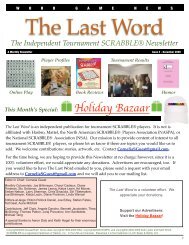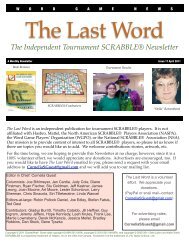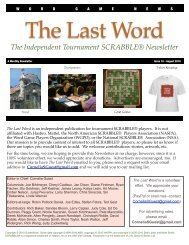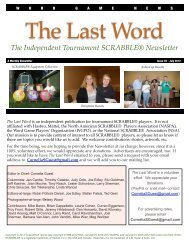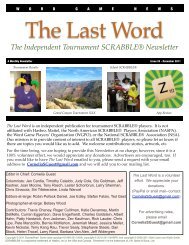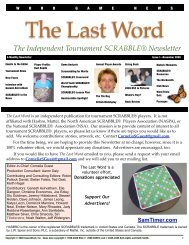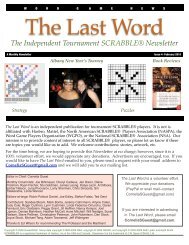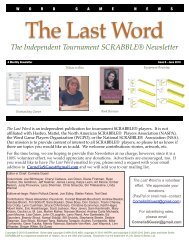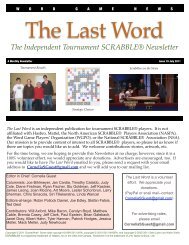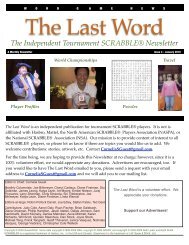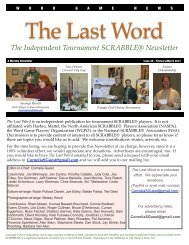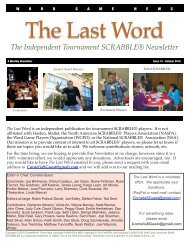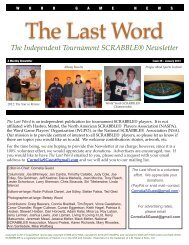SCRABBLE - The Last Word Newsletter
SCRABBLE - The Last Word Newsletter
SCRABBLE - The Last Word Newsletter
Create successful ePaper yourself
Turn your PDF publications into a flip-book with our unique Google optimized e-Paper software.
<strong>The</strong> <strong>Word</strong>smithLondon (and York) callingBy Chris SinacolaT H E W O R D S M I T HI cannot sleep on airplanes. I cannot understand how anyone can. So, the second half of mylinguistic tour of the Celtic and Anglo-Saxon lands – this time to England and Scotland - began asmy first had, with five-plus hours to read history.This time, it was Simon Jenkins’ A Short History of England, which offered a useful, whirlwind tour ofEnglish history from William the Conqueror to Queen Elizabeth and most everything in between –particularly useful for someone like me whose grasp of English history is suspect.<strong>The</strong> flight over was actually two flights, with a one-hour stop in Rekjavik, where we puzzled over theprices in the gift shop (in kronor) and soon concluded that everything was more expensive than ourbudgets and conscience would allow us to spend.I can’t tell you much about the Icelandic language, except to say that it is a North Germaniclanguage and distantly related to English, in the way that a third cousin twice-removed is related –you know you have something in common, but it might take hours over dinner to discover exactlywhat it is, and the rest of the time you have to put up with a harsh scraping sound that makes nosense to you.Once we had landed in England, made our bus connections, checked into the hotel and so forth, wehad a precious two hours of free time remaining in our first day. Several of our group decided to visitthe British Museum.If, as we did, you have about 90 minutes to see 8.5 million objects, you can do worse than to startwith the Rosetta Stone. Of all the artifacts on the planet, this is surely among the few that mattermost to language mavens.Young folks, and maybe a number of older folks, may think of a language instruction company whenthey hear “Rosetta Stone,” but the actual stone was, of course, the key to deciphering ancientEgyptian.Thanks to later discoveries, it is no longer the case that the Rosetta Stone is the only key tounlocking the Egyptian past, but it is surely true that the history of Egyptology and ourunderstanding of one of the world’s great civilizations would have unfolded in a very different andprobably much slower way without it.Egyptologists may dispute me on this point, but I think it fair to say that the Rosetta Stone’sdiscovery and translation in the early 19 th century played a role in spurring exploration of Egypt andother regions of the Middle East.Those explorations would, within a few decades, see Britain establish herself as the dominant forcethroughout the Middle East, Africa and Southern Asia, with enormous geo-political and socioeconomicconsequences that have echoed to the present day.And, lest we forget the linguistic consequences, it is surely the case that that British encounter withthe world – and British hegemony over large swathes of the globe – enriched British English and, in 63



